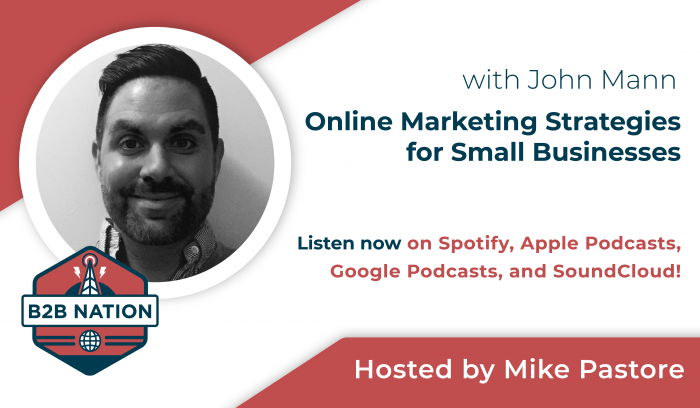One of the promises of a world connected by the Internet was that small businesses could be more competitive with larger corporations. The playing field might not be leveled, exactly, but it could be bigger for small businesses because geography was less of a factor in their marketing and sales strategy.
This is especially true for small B2B businesses like systems integrators, managed service providers, and consultants that are free to offer their services either virtually or wherever a client needs them.
But small businesses and entrepreneurs looking to increase their visibility online can’t simply build a website and call it a day. There are a number of established digital marketing strategies they can use to gain traction online, from search engine optimization (SEO) to content marketing, social media, and more.
If your small business lacks the expertise to understand, master, monitor, and optimize campaigns across these tactics, you might turn to someone like John Mann. John is a consultant who specializes in helping small businesses and entrepreneurs find and execute online marketing strategies that grow their business.
ALSO LISTEN TO: How to Market Your Business in the Changing IT Channel
In this episode of B2B Nation, we talk to John about how he helps small business owners make sense of all the online marketing options available to them, the misconceptions his clients often have about digital marketing, his favorite tools, and what the future holds. You can learn more about John Mann here: www.nashvilleseoconsultants.com/.
Podcast Highlights
3:29
John Mann: Before you begin any big digital marketing campaign… you want to make sure that all of the on-site issues, if there are any, are addressed on your website. So you want to fix all the holes in your boat before you set out to sea.
So that could be making sure your phone number… is clickable on mobile devices. That could be making sure your website is mobile friendly, has a mobile-friendly version with a responsive design. You want to make sure that maybe schema markup has been implemented. Maybe you want to redesign your website and you’ve been putting that off for a while. I would do that before beginning any big campaign. I would also maybe… 404 pages, broken links — redirect those to a live page. Because if you start an SEO campaign without addressing those, it’s going to be limited in its effectiveness.
After you address that, I think the best route for most businesses would be the organic search, landing page for lead generation route, because with SEO… that’s equity you’re putting into your website, when you publish content. Once your paid options — whether that’s paid social media, pay-per-click advertising — once the budget runs out, the results, they stop. But when you’re putting equity into your website, it’s going to keep yielding fruit.
8:24
Mike Pastore: How do you help clients decide which tactics or platforms are worth their time? And I’m sort of thinking about social media here. The list of platforms is getting pretty long… How do you help people decide? How do they prioritize? Which ones are the right ones for them? Which ones should they ignore, or maybe just put off for a while?
John Mann: OK, so before you get there, I think there are two steps I would recommend for businesses. One is to at least create a profile on every platform, even if you don’t plan on using it. There’s a concept called “social signals,” and it’s disputed how effective it is at helping your website rank, how big of a role it plays in SEO, but it’s better to be safe than sorry.
Make sure you have a profile on every platform. And then, after that, it’s good to identify a social media management tool to use, like a HootSuite, or Buffer, or CoSchedule. And they have scheduling built in to where you can schedule certain times of day, days in advance, and it just makes your social media management that much easier.
As far as the most effective platform for most businesses, that’s got to be Facebook across the board. And that’s because so many people are spending so much time on there, and with their targeting, with their advertising and targeting and boosting features, I found those to be very effective because of the data that we provide to Facebook. Facebook knows what kind of news sources we like, what kind of memes we hit like on, they know what kind of content we share with our friends, they know the types of businesses and restaurants we check into, so the data that they have makes it very easy for businesses to target potential customers.
So Facebook is definitely the best. After that, I would probably say LinkedIn, a close second. LinkedIn is excellent for prospecting, especially if you operate on a business-to-business model. You can find the decision makers; you can search by job title. There is a LinkedIn alternative called Alignable that’s very easy to use — probably one of the more underrated social media platforms.
